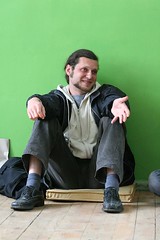
After breakfast in Diana’s house at noon, where we are staying, we met up with the other workshop participants, who would present their projects about letters at the Goatmilk Festival. The festival is organized by Diana, Mariana and Kalin from the Nova Kultura foundation for the fourth time. The festival is called after the goats of the village, which probably outnumber the people in the village.
One of the projects for the festival is called Glagolic Dictatorship. It was presented by Atanas as a member of the group who worked on it. Their argument builds on the fact, that with Bulgaria now being in the European Union, there are two official scripts in the Union. To avoid the problems this will inevitably cause, they propose to use a third alphabet, so that both the Europeans and Bulgarians at least share the same problems with a script. It turns out that the only pan-european script other than latinic that was ever used, was glagolic. So only the glagolic alphabet would be suitable. Clearly, a dictatorship can easiest be established by means no other than revolution. The Glagolic dictatorship is thought through to the smallest of details—including a flag, revolutionary indoctrination (the Slav version is rather intoxication) and a word-to-word transliteration of the European Constitution into glagolic script. Cveti and Desi work on a project that follows how the latinic transcribes public notices and road signs. The latinic is not able to capture properly certain Bulgarian sounds, so when a word is transcribed into latinic and read back, it is not only imprecise, but it also reduces the sound richness of the language. Some sounds do not have their letter in latinic, and their transcription can differ, such as in ъгъл (angle) is written as „agal“ or „ugul.“ Place names as Кърджали are transcribed as Kardjali, Karjali or Kurdjali, but none of the transcribed versions have the proper Bulgarian sound. Vania prepared a pocket guide of different styles of transcriptions of cyrilic into latinic, as practiced in „business“ and in informal personal emails. It is clear that somewhere deep, the Bulgarians are a bit irritated by the presence of latinic, and try to brace themselves against it. They have a very emotional relationship to their script. Those who live abroad even nostalgically miss the possibility to use a cyrilic keyboard. No wonder, when you go back and realize that their script was a revelation from God captured by Saint Cyril. The pope even recognized the cyrilic script as sacred already in 867 A.D.. So the cyrilic is not be taken lightly! It was around way before any of us were even hoping to be born!
Bela Rechka is in the Stara Planina mountains, which, together with the Dormitor mountains in Montenegro and mount Olympos in Greece, were the three pillars that held up the heavens in Aristotle’s idea of the world. We are travelling in this imaginary triagle—it is a territory of three sacred scripts—the Greek, the latinic and the cyrilic. And the food is good too.
No comments:
Post a Comment